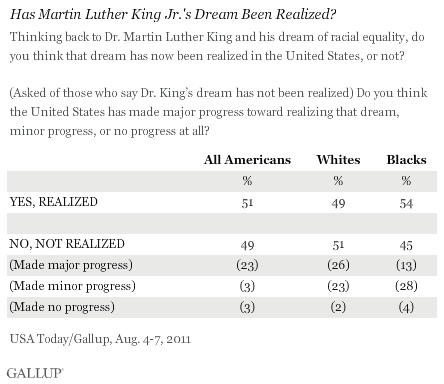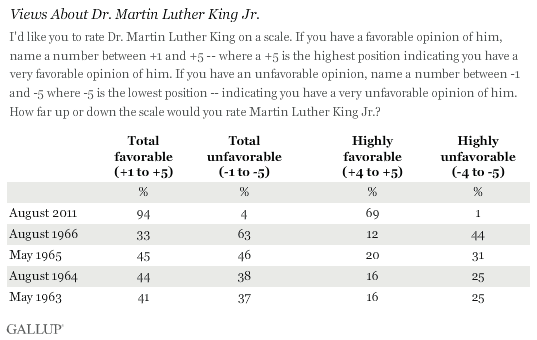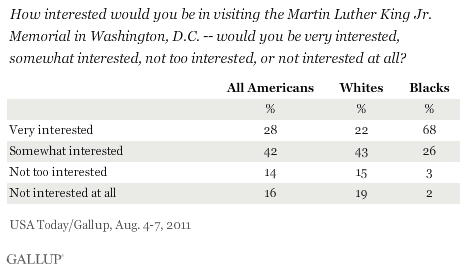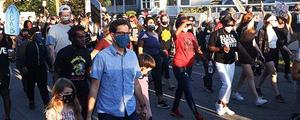PRINCETON, NJ -- Americans are about equally divided on whether Dr. Martin Luther King Jr.'s dream of U.S. racial equality has been realized, with 51% saying it has and 49% saying it has not. Blacks (54%) are slightly more optimistic than whites (49%) that the dream has been realized.

Americans who believe the dream has not been realized are about as likely to say the U.S. has made major progress toward attaining it as to say it has made minor progress or none at all. Thus, although a bare majority believe the dream has been realized, a total of 74% of Americans believe either that it has been realized or that major progress has been made.
These results are based on an Aug. 4-7 USA Today/Gallup poll conducted prior to the dedication of a new national monument to Dr. King in Washington, D.C. The poll included an oversample of black respondents.
Americans View King Very Positively, a Shift From the Past
The poll finds Americans have very positive views of King. Ninety-four percent rate him positively on a scale ranging from +5 (very favorable) to -5 (very unfavorable), including 69% giving him a +4 or +5 rating.
Gallup asked the same question several times in the 1960s, and the current numbers represent a dramatic shift in the way Americans view King now compared with the past. His prior ratings were at best slightly more positive than negative, and in a 1966 measurement, Americans were nearly twice as likely to have a negative (63%) as positive (33%) opinion of him. That negative evaluation was likely the result of his public opposition to the Vietnam War at a time when Americans still favored it as well as the opposition of some to the continued push for expanded civil rights and economic legislation to assist blacks.

In the current poll, 65% of whites and 95% of blacks give King a +4 or +5 favorable rating.
Americans Approve Of, Interested in Seeing New King Monument
Given the high regard Americans currently have for Dr. King, it is not surprising that 91% approve of having a national memorial to him. Blacks are essentially unanimous in their approval at 99%, while whites' support is a bit lower but still high at 89%.
Seventy percent of Americans say they are at least somewhat interested in visiting the memorial, including 28% who are very interested. Interest is much higher among blacks, with 94% saying they are interested, including 68% who are very interested.

Implications
King's legacy as the paramount figure in the civil rights movement is being recognized in the establishment of a national monument in his honor. His most important legacy, though, may be improvements in black-white relations and steps toward greater racial equality in the United States. Americans clearly see progress in this regard: 89% say black civil rights have improved over the course of their lifetime. Still, Americans believe there is work to be done, as nearly half are still not convinced that King's goal of true racial equality has been met.
Survey Methods
Results for this USA Today/Gallup poll are based on telephone interviews conducted Aug. 4-7, 2011, with a random sample of 1,319 adults, aged 18 and older, living in the continental U.S., selected using random-digit-dial sampling. This includes an oversample of 376 non-Hispanic blacks, consisting of 88 interviews done as part of the random national sample and 288 interviews with blacks who had previously participated in national Gallup polls and agreed to be re-interviewed at a later date. The data from the national sample and re-interviews are combined and weighted to be demographically representative of the national adult population in the United States and to reflect the proper proportion of blacks in the overall population
For results based on the total sample of national adults, one can say with 95% confidence that the maximum margin of sampling error is ±4 percentage points.
For results based on the sample of 376 non-Hispanic blacks, the maximum margin of sampling error is ±6 percentage points.
For results based on the sample of 796 non-Hispanic whites, the maximum margin of sample error is ±5 percentage points.
Interviews are conducted with respondents on landline telephones and cellular phones, with interviews conducted in Spanish for respondents who are primarily Spanish-speaking. Each sample includes a minimum quota of 400 cell phone respondents and 600 landline respondents per 1,000 national adults, with additional minimum quotas among landline respondents by region. Landline telephone numbers are chosen at random among listed telephone numbers. Cell phone numbers are selected using random-digit-dial methods. Landline respondents are chosen at random within each household on the basis of which member had the most recent birthday.
Samples are weighted by gender, age, race, Hispanic ethnicity, education, region, adults in the household, and phone status (cell phone only/landline only/both, cell phone mostly, and having an unlisted landline number). Demographic weighting targets are based on the March 2010 Current Population Survey figures for the aged 18 and older non-institutionalized population living in U.S. telephone households. All reported margins of sampling error include the computed design effects for weighting and sample design.
In addition to sampling error, question wording and practical difficulties in conducting surveys can introduce error or bias into the findings of public opinion polls.
View methodology, full question results, and trend data.
For more details on Gallup's polling methodology, visit www.gallup.com.
